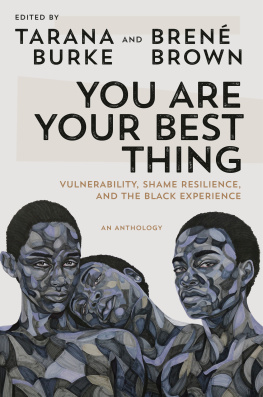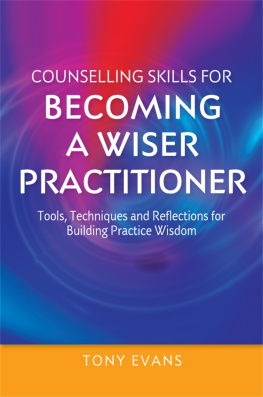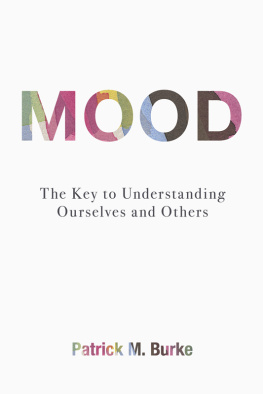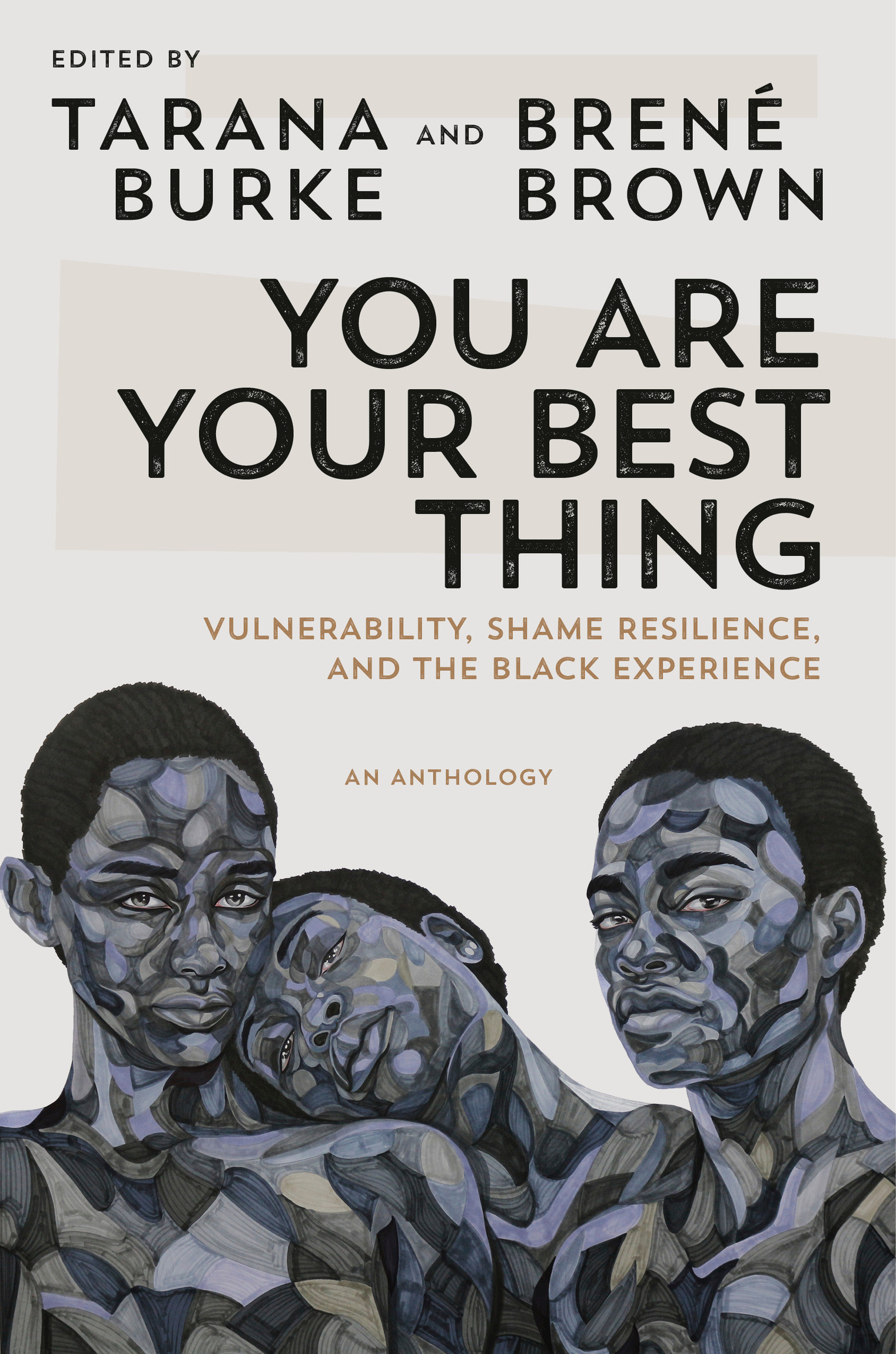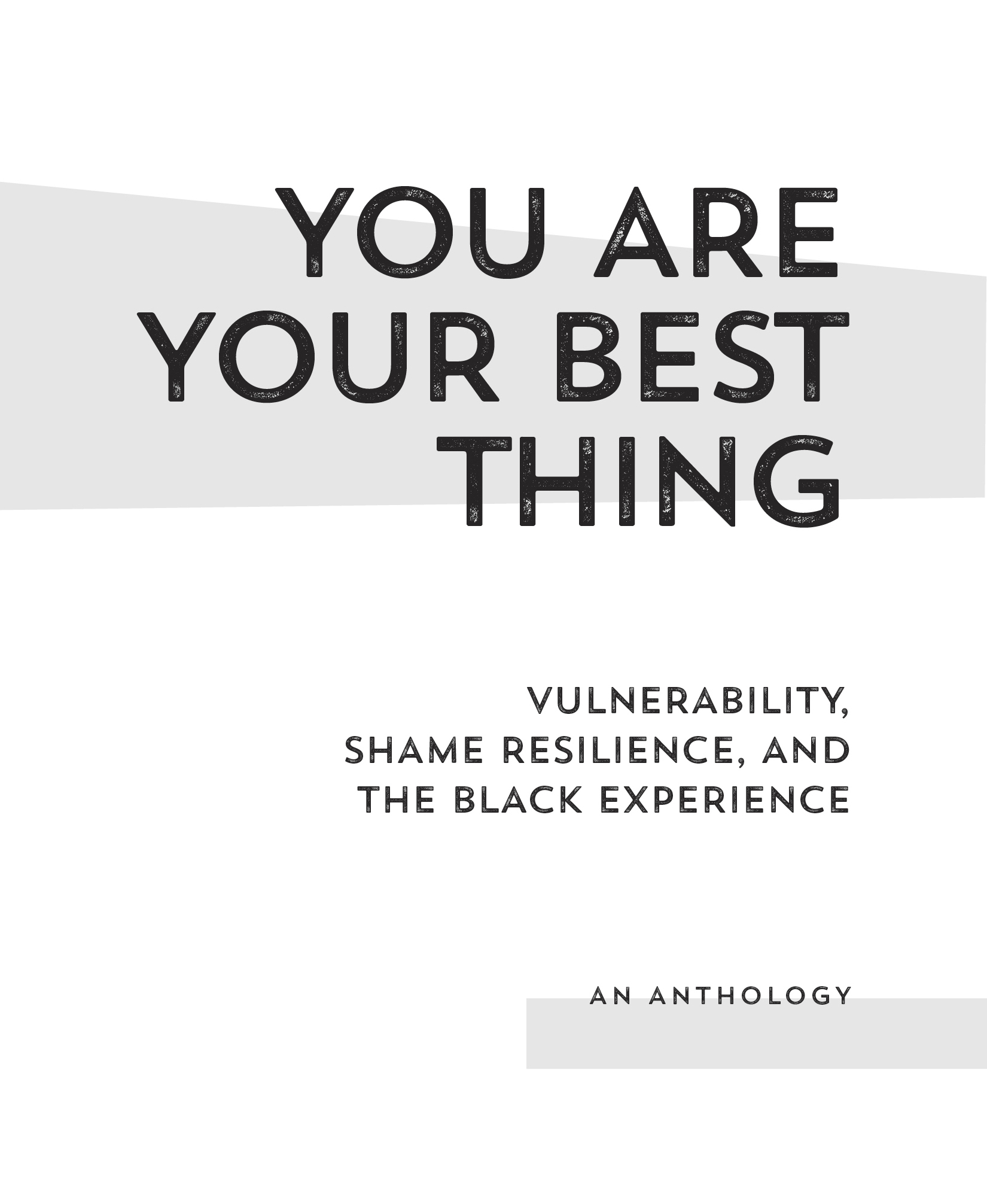Contents
Landmarks
Print Page List
Compilation copyright 2021 by Tarana Burke and Bren Brown
All rights reserved.
Published in the United States by Random House, an imprint and division of Penguin Random House LLC, New York.
Random House and the House colophon are registered trademarks of Penguin Random House LLC.
Contributor credits begin on .
Library of Congress Cataloging-in-Publication Data
Names: Burke, Tarana, editor. | Brown, Bren, editor.
Title: You are your best thing : vulnerability, shame resilience, and the black experience / edited by Tarana Burke and Bren Brown.
Description: New York : Random House, 2021.
Identifiers: LCCN 2020057201 (print) | LCCN 2020057202 (ebook) | ISBN 9780593243626 (hardback) | ISBN 9780593243640 (ebook)
Subjects: LCSH: Shame. | Resilience (Personality trait) | Vulnerability (Personality trait) | BlacksSocial conditions.
Classification: LCC BF575.S45 Y68 2021 (print) | LCC BF575.S45 (ebook) | DDC 152.4/4dc23
LC record available at https://lccn.loc.gov/2020057201 LC ebook record available at https://lccn.loc.gov/2020057202
Ebook ISBN9780593243640
randomhousebooks.com
Cover design: Global Prairie
Cover art: Toyin Ojih Odutola. Courtesy of the artist and Jack Shainman Gallery, New York.
ep_prh_5.6.1_c0_r0
Contents
Sethe, he says, me and you, we got more yesterday than anybody. We need some kind of tomorrow.
He leans over and takes her hand. With the other he touches her face. You your best thing, Sethe. You are. His holding fingers are holding hers.
Me? Me?
Toni Morrison, Beloved
BREN BROWN: We could start the story of this book when you texted me to ask if we could talk, and I thought you wanted to continue our ongoing conversation about wallpaper and landscapingbut what came before that? When did the idea for this book come to you?
TARANA BURKE : It was after we did #SharetheMic on social media, in the summer of 2020. There had been this intense public unrest happening in the country after George Floyd and Breonna Taylor were murdered. In private, I was having these really heartfelt conversations with Black folks who were just struggling: I cant watch any more of this. I cant take this anymore. I cannotAnd in public, the conversation was, How can we get white people to be better? How can we get white people to be antiracist? Antiracism became the order of the day. But there was no focus on Black humanity. I kept thinking, Wheres the space for us to talk about what this does to us, how this affects our lives? And so I was thinking to myself that I really wanted to have a conversation with you.
At first, I struggled to text you. I kept asking myself, Why am I hesitating to reach out to her?We have a close enough friendship to talk about anything. Your work is so important to me and my experience as a human being, but as a Black woman, I often felt like I had to contort myself to fit into the work and see myself in it. I wanted to talk to you about adding to it: What is the Black experience with shame resilience? Because white supremacy has added another layer to the kind of shame we have to deal with, and the kind of resilience we have to build, and the kind of vulnerability that we are constantly subjected to whether we choose it or not.
So, yeah, I called and said all of thatbut I was not as eloquent [laughter] at the time. I will never forget that phone call. I texted, Can we talk? and you texted back, Sure. Once we got on the phone and I shared the idea, the first thing you said was Oh, hell yeah. Oh, absolutely! Yes, I want to talk about that. Yes, I want to do this. At that point I was just thinking, Oh, and here I was worrying about offending you and wanting to have a real conversation. So, that was the beginning from my side. What was happening on your side?
BREN : From my side, well, admittedly, Id probably do anything you ask me to do. But the timing was bigger than us. I had really been grappling over the last couple of years with trying to figure out how to be more inclusivehow to present the work in a way that invited more people to see themselves. The last thing I ever wanted to do was put work in the world around shame, vulnerability, and courage, then make people feel like they had to do something extra to find themselves in it. I thought I had controlled for that with my sample, because Ive always been hypervigilant about diversity in the people I interview and in data sources. In fact, one of the early criticisms of my work was that the sample population actually overindexed around Black women and Latinx folks. But I started to get comments, especially from Black women and men: I had to work at it more to see myself in it than I would have preferred or I would have liked to or than I even should have had to. Finally, it was the combination of a conversation with you and a conversation with Austin Channing Brown on her TV show, where I thought, The problem isnt the research. The research resonates with a diverse group of people because its based on a diverse sample. But the way I present my research to the world does not always resonate because I often use myself and my stories as examples, and I have a very privileged white experience. That was the huge aha for me.
TARANA : Yeah, that makes sense.
BREN : One of the things that struck me was, in The Gifts of Imperfection, theres a scene where Im in sweats and have dirty hair and Im running up the Nordstrom escalator with my daughter to exchange some shoes that her grandmother bought her. Immediately, Im overwhelmed because I look and feel like shit, and theres all these perfect-looking people giving me the side-eye. Just as I start to go into some shame, a pop song starts playing and Ellen breaks out into the robot. I mean full-on, unfiltered, unawarejust sheer joy. As the perfect people start staring at her, Im reduced to this moment where I have to decide, Am I going to betray her and roll my eyes and say, Ellen, settle down, or am I just going to let her do her thinglet her be joyful and unashamed? I end up choosing her and actually dancing with her. Its a great story about choosing my daughter over acceptance by strangers, but Ive shopped with enough Black friends to know that if I was not dressed upeven if I was dressed upand I was in a department store and my Black daughter broke into a dance, there would be a whole other set of variables to consider. Including being hassled by security, possibly separated from my daughter, even arrested. So when you asked me if we could focus the work through the lens of the Black experience, it was a hell yes from me. I want to figure out how to better serve. In addition to telling my story, which I think is helpful, I want to co-create so people see themselves in this work. Co-creation is how we can tell stories from the Black experience that illustrate the data. Does that make sense?
TARANA : It does. This is our first time really digging into your grappling with this. Your questions make absolute sense, and it also makes sense why you wanted to do this together. You still said, Are you sure you want me to do it with you? You have my permission to use my work and do it.

